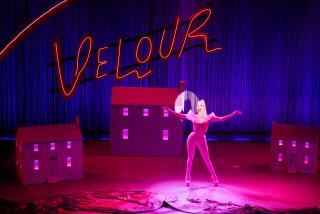Looking at Sylvester’s fabulous side
DISCO might not be to everyone’s taste, but in “The Fabulous Sylvester: The Legend, the Music, the Seventies in San Francisco” Joshua Gamson gives us a delicious picture of an era and of a black transvestite street kid called Sylvester James, then Dooni, then finally just Sylvester, with a drug habit and a penchant for petty larceny, who became a shamanistic healer for a generation of displaced persons. (Often erroneously lumped with the flower children of the ‘60s, these were the weed children from the back swamps who came to San Francisco and threw off their chains but could not so easily heal the wounds that the chains had cut into their souls.)
From rags to glittering riches, bedizened by his “jewelleries,” Sylvester, generously assisted by Gamson, steps fresh as paint out of the pages of gay history. Oscar Wilde clearly would have cherished him, and he, Sylvester, followed at least one Wildean precept ardently. Seeing that the only way to overcome a temptation is to yield to it, he yielded big time to the temptation to exist, something it was unwise to attempt alone at home. A “thou” was required, other than the one in the mirror. Thus Sylvester’s signature disco hit “You Make Me Feel (Mighty Real),” which Gamson ponders:
“ ‘Feeling real’ is an interesting notion, and a lot more was packed into that little song than Sylvester’s simple lyrics let on.... To feel real is to let out something you recognize as your genuine self: free of social airs and pretensions, unafraid, unhidden, honest,” he writes. “To feel real ... is to make the costume into your skin, to bring the fantasy self into actual being. This was the realness people might have felt watching Sylvester become a diva before their eyes.”
I asked Andrew Holleran, author of the novel “Dancer From the Dance,” what he thought about Sylvester, who was such a soaring phenomenon of the American ‘70s, such an unstable fusion of “The Tempest’s” Caliban and Ariel or else a mixture of Mick Jagger and Mahalia Jackson. I reasoned that the author of the perfect chronicle of queer abandon in that berserk decade would have something juicy to say about this legendary San Francisco marvel. “Sylvester! I loved him; he was the Handel of disco,” Holleran said. “There’s a book about him? I can’t believe it -- is it any good?”
Gamson’s book is better than good, as he traces Sylvester’s life from his upbringing in Los Angeles to his successful music career (he had three Top 40 hits in the ‘70s and ‘80s -- “Dance,” “You Make Me Feel (Mighty Real)” and “I Who Have Nothing”). For a time (in a terrible period of lurking terror) Sylvester disbursed Pentecostal gusto with the force of a Sissieretta Jones, a Leontyne Price, an Aretha Franklin, with an exotic, egret-feather trace of Josephine Baker. Then, as Gamson recounts, he died in 1988 at the age of 41 of AIDS-related complications.
Gamson shows how Sylvester triumphed though he didn’t have the commercial viability of white males with shamanistic tendencies (Elvis, Jim Morrison, Bruce Springsteen, Jagger) absent the idea of ministration with which Sylvester was imbued. Peace, joy, brotherhood and love -- all are words Sylvester freely used in a culture of music whose ostentation outdid even opera’s. Understanding also that all entertainment deriving from vaudeville aspires to the epitome embodied in Judy Garland, Sylvester went with Judy to Oz, and in the end found out that not only was there no place like home, home was after all Oz where he was.
The spirit of ‘70s San Francisco, an important manifestation of American social construction, is what makes Sylvester’s story different from the generic story of the fabulous black drag queen who unleashes great shock waves of power wherever he walks. Sylvester didn’t so much lose fame as dispose of it, along with his Caliban aspect.
After he became fully Sylvester, he had other things to do, such as be of service. Sylvester’s death, after a term of ministration about AIDS to his community in San Francisco, was the release of the pure spirit of Ariel into thin air. As a consequence, although sad indeed to read, there is no trace of the sordid in “The Fabulous Sylvester,” no trace at all.
*
James McCourt is the author of numerous books, including the novel “Mawrdew Czgowchwz” and “Queer Street: The Rise and Fall of an American Culture, 1947-1985.”
More to Read
The biggest entertainment stories
Get our big stories about Hollywood, film, television, music, arts, culture and more right in your inbox as soon as they publish.
You may occasionally receive promotional content from the Los Angeles Times.










